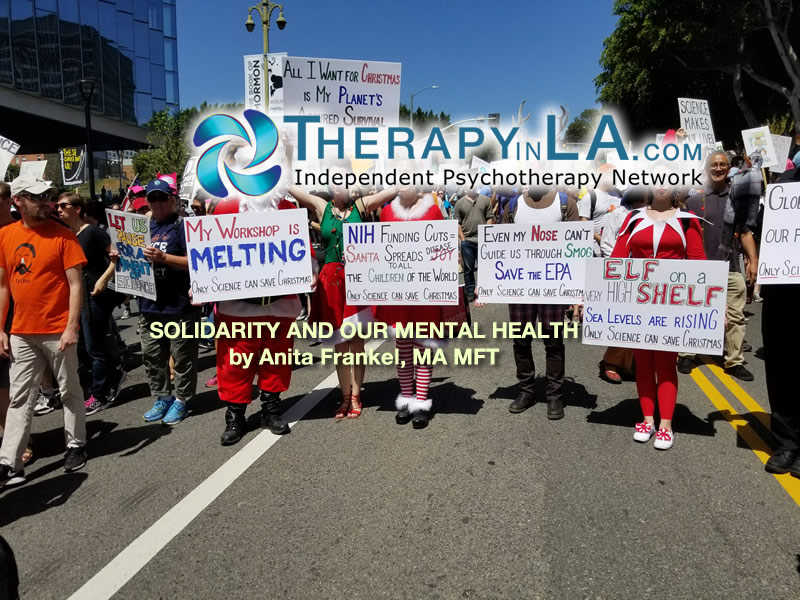
SOLIDARITY AND OUR MENTAL HEALTH
In November 2016, an Electoral College victory elevated to the White House an abusive, self-absorbed autocrat who promised to fight for the common man. While Trump’s contempt for science, for immigrants, for international norms, and his bullying style have pleased his base of support, particularly in the Midwest, those resisting Trump and his allies increasingly fear that we are losing our democracy.
Since Trump’s inauguration, we have seen the rapid growth of a movement called the Resistance. It embraces people of all generations, and is a remarkably diverse and decentralized network, powered by social media and sympathetic mainstream-media coverage. Today it encompasses a grassroots population of several million. These include petition signers, Congressional office phone callers, elected officials, town hall participants, and the hundreds of thousands of others in each major city who turned out for the Women’s Marches on Inauguration Day and other public demonstrations since then.
One of the qualities of the Resistance is the intersection of different social movements. Women, people of color, Muslims, Latino immigrants and citizens, gays and lesbians, defenders of the environment, and unions representing fast food workers, teachers, and other government employees, often signal support when any one group feels targeted or dismissed by the Administration.
Since the election, several of my clients have come in with stories of interrupted sleep, and persistent anxiety, and a sense of confusion as to whether they should be paying more attention or less attention to politics. I suggest that they are not alone in their concerns, and that being in touch with others who feel similarly, and even joining in some public display together, could be a useful for regaining equilibrium and sense of possibility.
University of Minnesota psychologist William Doherty has written about a new concept of the healthy Self in the Age of Trump. He calls it the Connected/Committed Self, one that first of all works actively to maintain empathic connections with other people. Durable relational connections nourish our sense of self-worth even as they nourish the self-worth others. And yet, the Ideal of the Connected Self can be captured by the forces of consumerism and packaged as “a consumer desire… encouraging us to feel entitled to the best possible relationships that require little maintenance and offer high rewards.” And so, says Doherty,
… [T]he Connected Self must have an ethical dimension. It must embrace commitment,
by which I mean sustained investments in something outside oneself, to relationships and causes that transcend us, extend us, challenge us, and require continual struggle to balance and manage. 1
There are many kinds of activism in the greater Los Angeles community. On a daily basis, social media adds new links to the latest petition and postcard drives, and appeals for calls to elected representatives. There is something energizing about attending and perhaps speaking up at town hall meetings, and/or joining one of those peaceful demonstrations with a forest of homemade signs. All these activities put to productive use the heightened vigilance that comes with anxiety, and can be a powerful hedge against depression. Ultimately, acts of resistance are also acts of citizenship. They may just be what it takes, to make America psychologically safe again.
___________________________________
1Doherty, William. “Psychotherapy’s Pilgrimage: Shaping the Consciousness of Our Time.” PSYCHOTHERAPY NETWORKER, January/February 2017. p. 29.
_________________________
This article represents the views of the author and not IPN as an organization. It was edited and revised from an earlier article on the website, under the author’s name. Formerly a public affairs radio journalist and producer, Anita Frankel is a psychotherapist in private practice in the Silverlake neighborhood of Los Angeles. She is a member of the Independent Psychotherapy Network. You can call her at (323) 661-0297, or email her at afrankel@earthlink.net,
Copyright 2018 by Anita Frankel, MA MFT
